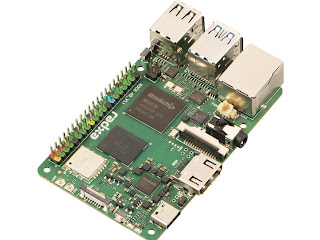The single-board computer (SBC) market has long been dominated by the Raspberry Pi, but a growing number of competitors are stepping up with impressive alternatives. One of the latest contenders is the Radxa Rock 4D, a feature-packed board that brings PCIe support and a neural processing unit (NPU) to the table—capabilities that even the Raspberry Pi 5 lacks.
What Makes the Radxa Rock 4D Stand Out?
The Rock 4D is powered by a Rockchip RK3588S system-on-chip (SoC), featuring a quad-core Arm Cortex-A76 and quad-core Cortex-A55 CPU configuration, delivering strong performance for embedded computing, home servers, and AI applications. But the real highlights are its PCIe 3.0 interface and a 6 TOPS NPU, making it a compelling choice for developers working on machine learning, networking, or storage projects.
PCIe 3.0 Support – Unlike most Raspberry Pi models, the Rock 4D includes a PCIe x4 slot, allowing users to connect high-speed NVMe SSDs, GPUs, or network cards.
- 6 TOPS NPU – The built-in neural processor accelerates AI workloads, making it ideal for object detection, voice recognition, and other edge AI applications.
- Up to 32GB RAM – A significant upgrade over the Raspberry Pi’s 8GB limit.
- Dual 4K HDMI outputs – Supports high-resolution displays for multimedia or digital signage.
Where to Buy the Radxa Rock 4D
For those interested in picking one up, the Rock 4D is available for purchase at Arace Tech, with different RAM and storage configurations. Alternatively, you can also find it on Amazon for quick shipping.
How Does It Compare to the Raspberry Pi 5?
While the Raspberry Pi 5 remains a favorite for its software ecosystem and community support, the Rock 4D offers more expandability and AI capabilities out of the box. The inclusion of PCIe alone opens up possibilities that Raspberry Pi users typically need expensive add-ons or workarounds to achieve.
However, the Rock 4D’s software support isn’t as mature as the Pi’s, meaning some tinkering may be required for certain applications. Still, for developers and hobbyists who need higher performance, AI acceleration, or PCIe expansion, the Rock 4D is a strong alternative worth considering.
Would you choose the Radxa Rock 4D over a Raspberry Pi? Let us know in the comments!

